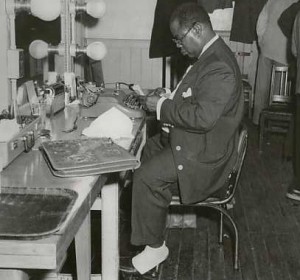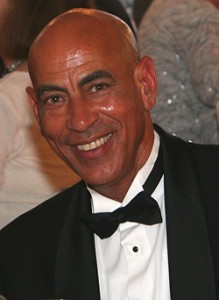.jpg)
Louis Armstrong, Chicago ca.1933. Photo in public domain.
Images of young Louis Armstrong dancing the Charleston in a show-stopping production number at Chicago's Sunset Cafe in the 1920s. Recollections of the Hot Fives recording sessions from his tough-talking manager, Joe Glaser. And trumpet king Mutt Carey's memories of Armstrong as a teenager hanging out at a gig at New Orleans' Lincoln Park.
If there is a "founding father of jazz," Louis Armstrong deserves the title more than anyone else. His innovations on trumpet virtually defined the art form. As singular as his contribution to American music is, equally vital is a study of Louis Armstrong, the man.
Louis Armstrong's life is chronicled in his own writing and in oral histories collected by others. In the early 1950s jazz writers Nat Hentoff and Nat Shapiro were in the first wave of serious collectors to publish oral histories by the then "living legends of jazz." Their 1955 book, Hear Me Talkin' To Ya—a classic of jazz history—is full of recollections about Louis Armstrong by jazz greats who knew him.

Armstrong backstage with his Smith Corona typewriter. Photo courtesy Louis Armstrong House and Archives.
Armstrong spent almost as much time punching the keys of his beat-up Smith-Corona typewriter as he did performing. He took a reel-to-reel tape recorder with him on the road and used it as a journal, recording his reflections on life. He also wrote thousands of letters and hundreds of pages of memoirs backstage, on trains and planes, and in hotel rooms. Armstrong's memoirs give us a priceless window into his origins and therefore into jazz itself.
This week on Riverwalk Jazz, Broadway's Vernel Bagneris reads excerpts from Hentoff and Shapiro's Hear Me Talkin' To Ya and joins Jim Cullum and the Band on Armstrong classics like "I Can't Give You Anything But Love" and "Swing That Music" and a lesser-known number, "Too Busy." The Jim Cullum Jazz Band performs seldom-heard classics from the Armstrong repertoire, among them "Jazz Lips," "Tears" and "Song of the Islands."
Photo credit for Home Page: Louis Armstrong. Photo courtesy jazzscript.co.uk.
Text based on Riverwalk Jazz script by Margaret Moos Pick ©2011


